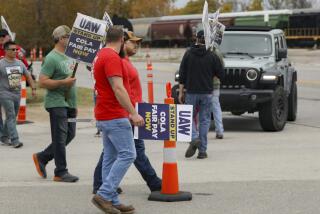Bush might divert funds to automakers
- Share via
WASHINGTON — With General Motors and Chrysler near bankruptcy and the failure of a $14-billion bailout bill for U.S. automakers, the White House was preparing to step in with short-term aid to prevent what could be a catastrophic hit to the economy.
President Bush and Treasury Secretary Henry M. Paulson were weighing their options Friday, although officials said action was unlikely this weekend.
The White House said Bush was considering tapping the $700-billion Wall Street bailout fund -- even though he previously said that money should be used only for financial institutions.
“A precipitous collapse of this industry would have a severe impact on our economy, and it would be irresponsible to further weaken and destabilize our economy at this time,” White House spokeswoman Dana Perino said.
General Motors has said it needs $4 billion by the end of the month and an additional $6 billion by March 31, and Chrysler also was asking for $4 billion in emergency loans to make it to the spring. Ford has not requested funds but has said the failure of GM or Chrysler would endanger it as well.
The White House statement came as GM announced massive production cuts through the first quarter of next year, reducing its vehicle output by about 30%, or 250,000 vehicles. It will do that by idling 21 plants for a month, including three each in Canada and Mexico.
Chrysler had no statement Friday on the failure of the bailout bill in Congress, but Chairman Robert Nardelli, in an internal e-mail, told employees, “We must eliminate every unnecessary cost in every aspect of our business. . . . Continued cost reduction is important to ensure the future viability of the company.”
GM stock dropped 4.4% on Friday to $3.94 and Ford shares fell 5.2% to $2.39. Chrysler is privately held.
News of possible help from the White House tempered fears on Wall Street and in Detroit. GM spokesman Tony Cervone said the company was “encouraged by the White House’s willingness to consider other options.”
But at Star Ford in Glendale, Kevin Gorman was worried about the auto industry.
“It seems like it’s another sign that our country is in a recession,” said Gorman, a retail sales manager who was getting his Mustang serviced. He said a bailout would help the economy.
For some of the 1.2 million employees at auto dealerships nationwide, the failure of the bailout in Congress stoked fears.
“Considering my job and things going for the worse, it’s not good,” said Javier Alvarez, assistant service manager at Star Chrysler/Jeep in Glendale. He said sales and service business at the dealership had dropped 30% to 40% this year.
American automakers are not alone in suffering weak sales amid the recession and credit crisis. Honda Motor Co., which saw its U.S. sales decline 32% in November compared with last year, said Friday that it would deepen already announced cuts in first-quarter production, eliminating a total of 175,000 cars and trucks from its planned output.
But U.S. automakers -- and the hundreds of thousands of direct and indirect jobs they provide -- were the main concern of the Bush administration and lawmakers. A failure of one of Detroit’s Big Three could take all of them down because of the supply chain they share, leading to the loss of hundreds of thousands of jobs.
The bailout legislation, which passed the House on Wednesday but was killed by Republican opposition in the Senate on Thursday, would have provided up to $14 billion in emergency government loans to GM and Chrysler.
The money would have come with restrictions, including a requirement that the companies that accept aid outline plans for major restructuring by March 31 under the oversight of an industry monitor, or “car czar,” appointed by the president.
Democratic leaders in Congress have pushed Bush to use the Wall Street fund to provide emergency aid to the automakers. He had adamantly resisted, preferring that Congress redirect money from an existing $25-billion fund to help automakers retool their factories to produce more fuel-efficient vehicles.
Bush was briefed on the legislation’s failure late Thursday and was in consultation with his economic advisors, Perino said.
Paulson could allow short-term loans from the $700-billion fund and attach conditions similar to those laid out in the failed legislation or others. The administration could lend the automakers just enough money to get them through late January, when President-elect Barack Obama will be inaugurated.
“Because Congress failed to act, we will stand ready to prevent an imminent failure until Congress reconvenes and acts to address the long-term viability of the industry,” said Treasury Department spokesman Brookly McLaughlin.
Obama has called for helping the auto industry and said Friday he hoped Congress and the Bush administration would “still find a way to give the industry the temporary assistance it needs while demanding the long-term restructuring that is absolutely required.”
Some Senate Republicans blamed the United Auto Workers for failing to agree to a key concession that they said would have drawn enough GOP support to pass the bailout bill. They also were angry with Bush for reversing his position on potentially using funds from the Troubled Asset Relief Program, set up for the financial industry.
“As the Bush administration changes course once again, it is becoming clear to me that Washington, D.C., might be completely out of control,” said Sen. James Inhofe (R-Okla.), a bailout opponent.
UAW President Ron Gettelfinger and auto industry supporters in Congress said the UAW was asked to make concessions that other stakeholders were not. After agreeing to significant rollbacks on payments from the auto companies to a fund for retiree healthcare, the UAW balked at a demand that it agree to a specific date for the wages of its Detroit workers to be on par with those of American employees of foreign automakers.
“The demand by the Senate GOP caucus would have no question treated workers differently from every other stakeholder, instead of leaving it to the auto czar to work out the timetable and mechanism for implementing sacrifices by all of the stakeholders,” Gettelfinger said.
Democratic supporters of the bailout welcomed Bush’s decision to consider using TARP money and urged him to act quickly. Senate Banking Committee Chairman Christopher J. Dodd (D-Conn.) said he hoped for action this weekend.
“I’m very confident . . . that the White House will not allow this industry to collapse or go into an unplanned bankruptcy,” he said.
--
Times staff writer Mark Medina contributed to this report.
jim.puzzanghera @latimes.com







